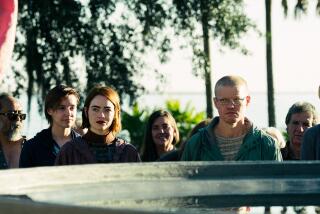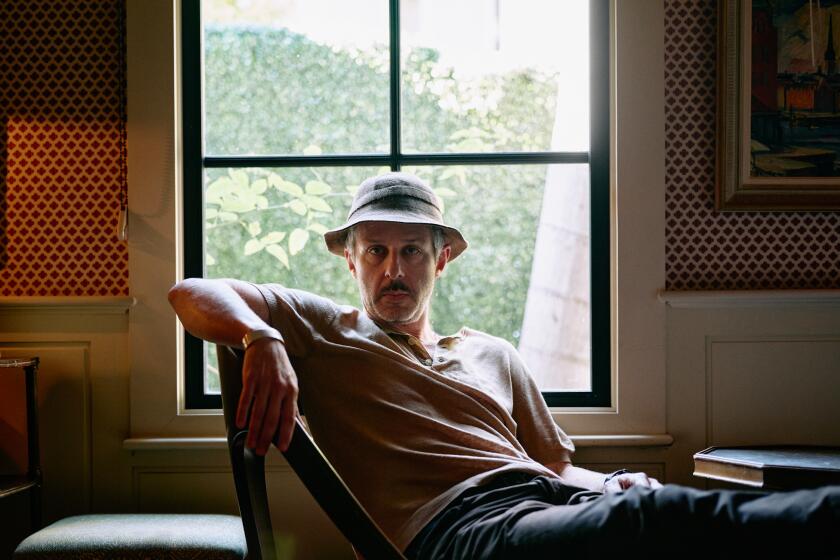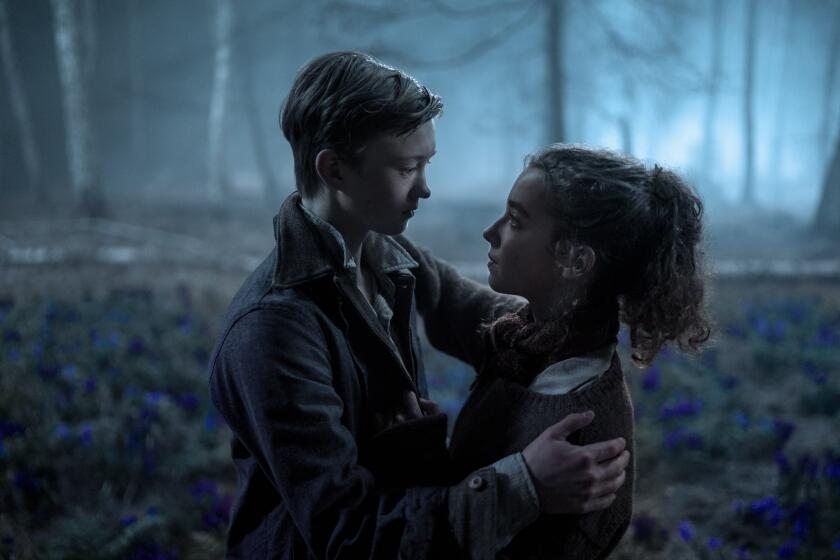Toronto 2015: Rachel Weisz calls absurdist love story ‘The Lobster’ ‘romantic with a capital R’

Director Yorgos Lanthimos, left, and actress Rachel Weisz stand on the red carpet for the movie “The Lobster “ during the 2015 Toronto International Film Festival.
Friday afternoon at Toronto’s Princess of Wales Theatre saw the North American premiere of “The Lobster,” the new film from Greek filmmaker Yorgos Lanthimos. The director shot to international acclaim with his 2009 film “Dogtooth,” which went on to an Oscar nomination for best foreign-language film.
“The Lobster,” which had its world premiere earlier this year in the main competition at the Cannes Film Festival, is Lanthimos’ first film in English, and has attracted an exceptionally starry international cast. Appearing in the film are Colin Farrell, Rachel Weisz, Lea Seydoux, John C. Reilly, Ben Whishaw, Olivia Colman and Michael Smiley alongside previous Lanthimos collaborators Angeliki Papoulia and Ariane Labed.
While still marked by the abstracted storytelling of “Dogtooth” and his subsequent “Alps,” this time out, Lanthimos is concerned with affairs of the heart, which makes for a movie that, despite its surface strangeness, is warmer, more moving and conventionally emotional.
SIGN UP for the free Indie Focus movies newsletter >>
The film begins with a woman shooting a donkey in a field in what appears to be a crime of passion. It is soon revealed that within the world of the film, people who are single are sent to a country hotel where they have 45 days to find a partner or are transformed into the animal of their choosing. After a breakup, Farrell’s character is sent there, and the clock starts ticking. (He would chose to be a lobster, giving the film its title. Whether he becomes one might be considered a spoiler.)
Additional days can be earned during regular hunts in the woods for Loners, a loose band of rebels who live alone. With his time almost up, Farrell’s character joins them, meeting their leader (Seydoux), who explains that there is no flirting or coupling-up. They even dance alone to music on headphones. Farrell of course meets a woman (Weisz) with whom he becomes immediately smitten.
The switch to English language and intentional stars tends to highlight the dark humor that runs through all of Lanthimos’ work. There is a slapstick air to a paunchy Farrell struggling to undress with one hand cuffed behind his back. (Another rule.) When asked whether he would classify himself as heterosexual or homosexual, the brief, indecisive pause Farrell gives to the moment is both funny and fascinating. And Seydoux’s perennially dismissive side-eye will presumably be the making of online GIFs soon enough, as well as Labed’s wildly expressive dancing in the woods.
A Q&A after the screening (attended by Lanthimos and Weisz) began with a question regarding where the idea for the film.
“It’s always hard to pinpoint where an idea starts and you end up making a film,” Lanthimos said.
“This time we wanted to do something about relationships. So it just came naturally that we would do this,” he said, to laughs from the crowd, regarding his ongoing collaboration with co-writer Efthimis Filippou. “Because we’re not really interested in just representing reality, but we’re always trying to find a way to structure a world and a system in which you can actually observe human behavior in extreme situations. So we always try to find what that device could be.”
For all the brilliance of Lanthimos’ previous films, his reliance on abstraction could make them, at times, cold and distanced. With “The Lobster,” there is a new emotional current to the work that is as different as his decision to work in English.
Though some responses to the film have preferred either one half or the other, the move from the hotel to the woods is an essential part of the film. As it reshapes itself into a romance between Farrell and Weisz (whose names are “David” and “Short Sighted Woman,” respectively), the movie becomes a deeply felt examination of commitment and sacrifice.
“I think it’s extremely romantic,” Weisz said. “Romantic with a capital R in the true sense of romantic, in that it’s love that is unattainable or has huge, huge, huge odds to surmount to get there, like Romeo and Juliet. This is a world where it’s impossible for these two people to be together, so I think that they find love, I find that very romantic.”
Near the end of Friday’s Q&A, a long question from the audience touched on political elections and the ways in which people obey rules and systems of order, to which Lanthimos replied: “All the things you’re saying are really the answer. You’re describing a version of the film.”
Lanthimos noted, “It’s nothing so specific, but we were trying to show and raise questions about how people follow the rules we impose on ourselves. If we just get used to them and don’t question them anymore, are the rules that we’re creating serving everyone and is everybody free to choose what they really want or not? All these kinds of questions, these are the questions being raised.”
“And another of my interests in making the film is that the main character rebels,” Lanthimos added, “but in a way, he joins this other system, which in the beginning seems very different, more liberal or free, and then winds up being very similar to that. So there’s an irony about when we’re trying to escape from a certain situation and we end up creating a similar one.”
Follow on Twitter: @IndieFocus
More to Read
Only good movies
Get the Indie Focus newsletter, Mark Olsen's weekly guide to the world of cinema.
You may occasionally receive promotional content from the Los Angeles Times.











